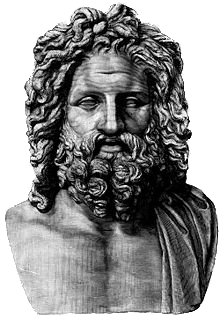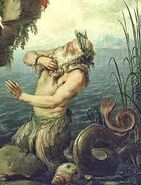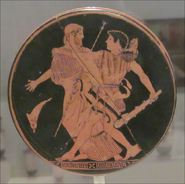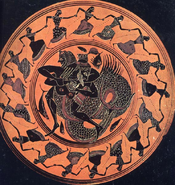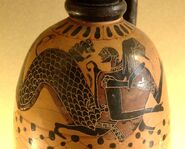Nereus (Ancient Greek: Νηρευς) was the eldest son of Pontus (the Sea) and Gaia (the Earth), who with Doris fathered the fifty Nereids and Nerites, with whom Nereus lived in the Aegean Sea. He was the old man of the seas, and of the sea's rich bounty of fish.
He was believed, like other marine divinities, to have the power of prophesying the future and of appearing to mortals in different shapes, and in the story of Heracles he acts a prominent part. Nereus appears in few myths, but he is important nonetheless.
Mythology[]
The Apples of the Hesperides[]
Heracles, on his penultimate task, was asked to pluck three golden apples from the tree of the Hesperides, (nymphs of the evening). Heracles set off toward the west. While on his quest, Heracles came across some river nymphs who told him that Nereus, the old man of the sea, would know the whereabouts of the garden. Heracles found and asked him for directions. When Nereus refused, Heracles leapt on the sea-god, and held him in a clinch, but Nereus could transform himself into many forms, including fire and water. However, Heracles held on and in the end Nereus was forced to give the hero the directions he needed.
Gigantomachia[]
Based on a frieze of the Pergamon Altar, it is evident that Nereus took part in the war against the Gigantes. The frieze shows Nereus and Doris fighting a Gigantes (Okeanos also is present in the frieze).
Appearance[]
He is usually depicted as an old man with a long beard. He usually has a long wooden staff and sometimes has a coiling fish tail instead of feet. Unlike Triton or Achelous, Nereus is always clothed.
Parents[]
Gaia (Mother) & Pontus (Father)
Spouse & Lovers[]
Doris (Okeanid) (wife)
Children[]
Nereids - 50 Daughters (Including Amphitrite)
Glaucus - Son
Powers[]
- Nereus can see the future
- Nereus is a shapeshifter
Gallery[]
Classical Text[]
"Nereus and rich-haired Doris, daughter of Ocean the perfect river, were born children,11 passing lovely amongst goddesses, Ploto, Eucrante, Sao, and Amphitrite, and Eudora, and Thetis, Galene and Glauce, Cymothoe, Speo, Thoe and lovely Halie, and Pasithea, and Erato, and rosy-armed Eunice, and gracious Melite, and Eulimene, and Agaue, Doto, Proto, Pherusa, and Dynamene, and Nisaea, and Actaea, and Protomedea, Doris, Panopea, and comely Galatea, and lovely Hippothoe, and rosy-armed Hipponoe, and Cymodoce who with Cymatolege12 and Amphitrite easily calms the waves upon the misty sea and the blasts of raging winds, and Cymo, and Eione, and rich-crowned Alimede, and Glauconome, fond of laughter, and Pontoporea, Leagore, Euagore, and Laomedea, and Polynoe, and Autonoe, and Lysianassa, and Euarne, lovely of shape and without blemish of form, and Psamathe of charming figure and divine Menippe, Neso, Eupompe, Themisto, Pronoe, and Nemertes13 who has the nature of her deathless father. These fifty daughters sprang from blameless Nereus, skilled in excellent crafts."
